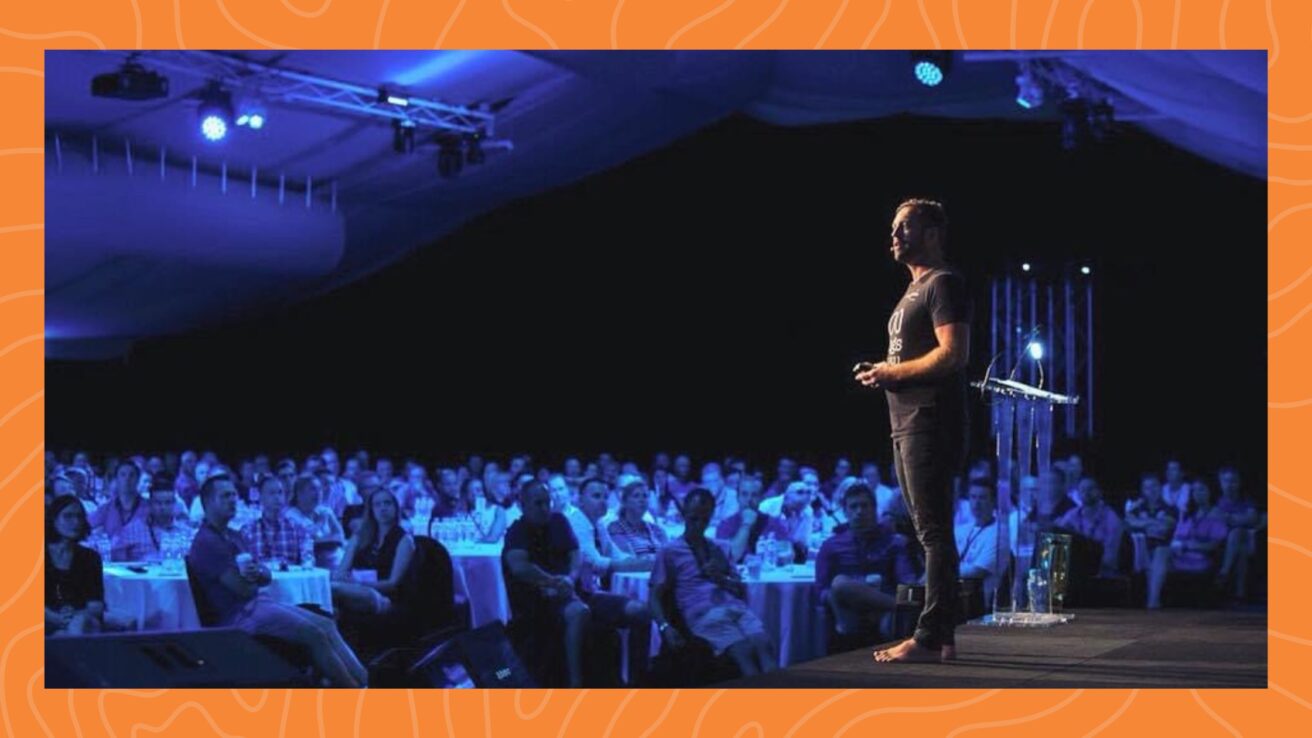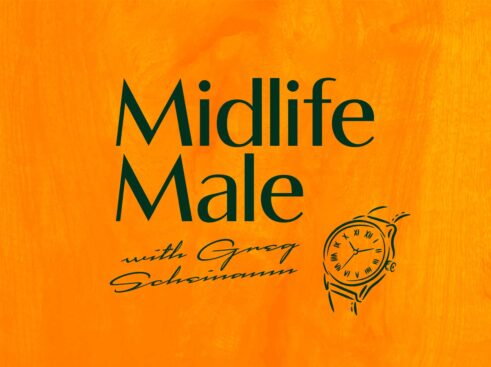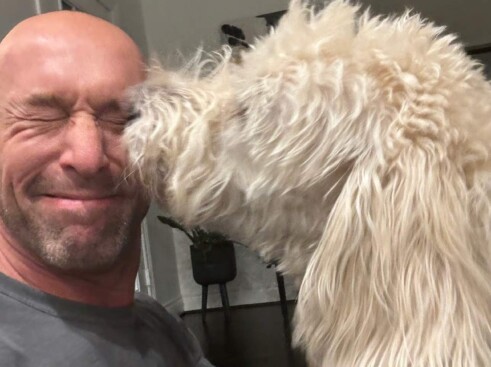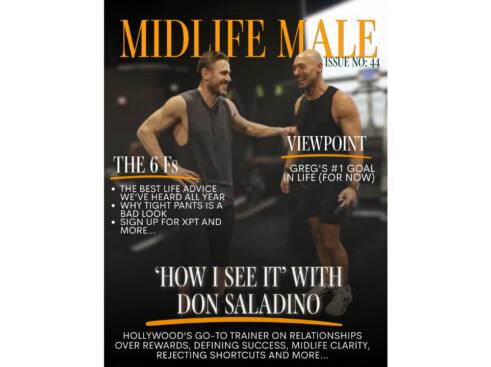Sebastian Terry is one of my favorite people. I met Seb 3 years ago at my first Impact Eleven Bootcamp in Detroit.
We were all just getting our start. Impact Eleven was actually called 3 Ring Circus at the time, the event was being held in a dingy comedy club, and they had not fully developed their concept. Paul Epstein was there long before he started “Winning Monday,” Suneel Gupta was there before he became “Backable,” and Naren Aryal was there before his brand Amplify Publishing truly amped up and became a publishing powerhouse.
Josh Linkner and Peter Sheahan led the charge, and the room was small, yet mighty. You could just feel that we were all “on to something.” Which brings me back to Seb.
We’re sitting at dinner the first night. The interesting thing about being around a group of speakers is that nobody wants to speak about themselves because that’s what we do all the time, so everyone’s jockeying for position to ask questions and get everyone else talking so that we can then sit back, STFU and listen and learn.
Seb gets to talking and I’m immediately intrigued. I don’t know anyone like this guy. He’s funny, confident-yet-humble, worldly and has a “live without regret” energy about him as a free spirit. No wife, kids, job, or anything else holding him back. He’s a master storyteller. I come to find out that he made a list of 100 things he wanted to do and then actually went out and did them! And that’s what he talks about.
It’s simple. It’s honest. It’s brilliant. And why is it so captivating? Because most of us DON’T do this. We don’t do the things we want to do. We don’t do the things we say we’re going to do, and the real truth is most of us don’t ever even take the time to think about what we want our lives to look like or feel like. We don’t write down what we want to do, and that, my friends, leads to regret.
Another thing I admire about Seb is that he speaks when he has something to say. And that’s rare today in a world where just about everyone is throwing up every thoughtless thought that pops into their head and posting it on “the gram.” He puts out a newsletter when he feels like it. And that makes it a must-read because I know when I see it in my inbox that it’s going to be good, unlike the 30 or so newsletters that bombard me daily (and keep coming back even after I’ve deleted them and unsubscribed from them).
So I wanted to share his most recent newsletter with you and reiterate that maximizing middle age is about reducing and eliminating regret. It’s about living life by design, not default. It’s defining what success looks like for you, then living that way. It’s about not breaking the promises you make to yourself, not breaking the promises you make to others and not making too many promises – period.
Jim Rohn said “there are two kinds of pain: the pain of discipline and the pain of regret. The only difference is that the pain of discipline weighs ounces, while the pain of regret weighs tons.” You get to choose which one you want to carry. Better one, or better two?
Here’s the newsletter from Seb, reprinted here with his permission. Subscribe to his newsletter by visiting the footer of his website.
—
Over the past few months I’ve been reaching out to you, the community, and gathering different data points in and around the topic of regret. Most recently I sent out a survey with 5 specific questions and over the last week or so, using a stethoscope and a scalpel, I’ve been peeling back the layers and analyzing the results with great interest.
What started as an idea turned into what presents almost as a white paper and so at the risk of boring you all to death, I’ve decided to break down my findings into a series of newsletters that share a story line of findings and (hopefully!) a useful conclusion for us all.
We live in a world where regret is generally viewed as a negative thing, to be avoided at all costs and although 27% of us lay claim to a life devoid of regret, we don’t need a Harvard diploma for us to acknowledge that individual regret is as common as an awkward first-kiss story; most of us have them (hey Brooke!). Layer on top of this the mainstream messaging from thought leaders and motivational speakers (sorry!) who tell us that we should be living with no regrets, it makes me wonder whether this is a) possible or b) helpful?
So, now armed with fresh and juicy survey results, let me start this Regret Mini-Series Review in a way that I hope settles any nerves that you may have as you read the word REGRET.
If you’ve ever been worried that you might be the only person who experiences regret, don’t be! These latest findings show us that you’re not alone. It turns out that the overwhelming majority of us, 73% in fact, experience regret in one form or another.
Not only that, but it turns out that the it comes to regret, there’s actually three groups of people:
- Those who don’t have regret (27%)
- Those who have regret but manage in a positive way (58%), and
- Those who have regret but it impacts their lives in a negative way (15%)
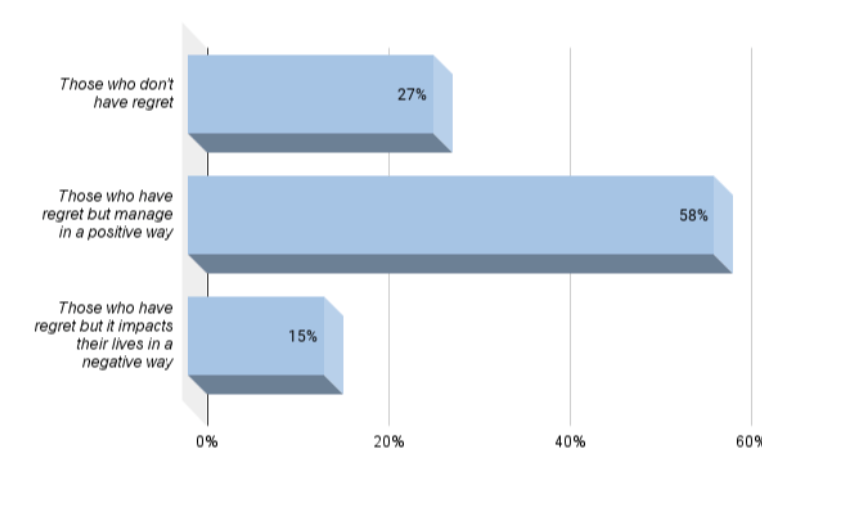
The survey questions I asked were:
- Does regret impact your life?
- What is your biggest regret?
- Have you learned a valuable lesson from regret?
- In five words or less, what would your life look like if you had no regret?
- What advice would you give to a loved one to help them?
Defining Mistakes Vs. Regret
From the outset, I think it’s important to make the differentiation between having a regret and making a mistake. There seemed to be some confusion around this. Although inextricably linked, mistakes and regrets are two very different things.
Whereas making a mistake pertains to a misguided action or decision in our real life i.e not staying in touch with loved ones as often as we would have liked (one of the most common regrets shared in our survey, by the way!), regret is the psychological response that we internally harbor as a result of that action i.e the feeling of being a bad son for not spending time with your father over a long period (also a common answer from Question 2).
With that said, we are definitely not here to try and correct for general mistakes being made. Quite the opposite; mistakes are an inevitable part of the human experience and are crucial for learning and growth. By default, mistakes should be embraced.
What I feel is far more helpful is to consider how we respond to a mistake, and whether by the same token we can also embrace regret, as opposed to fearing it.
With a staggering 93% of people surveyed admitting that regret had taught them a valuable lesson in life which has helped them grow, learn and adapt, I’m optimistic.
It’s clear that with the right mindset, regrets can be hugely beneficial to us.
Common Regrets
So the juicy part!
To give a little more color to the actual regrets that were shared, I’ve compiled a short list below which captures the general trend of responses below:
- Worrying too much and not following my heart as a consequence
- Second guessing myself and chickening out of certain conversations!
- Caring too much of what others thought of me
- Not delving deeper into knowing more about the lives of my parents. Gone too soon
- Not having the confidence in early adulthood to share feelings and pursue rel’ships
- Not staying true to myself and listening to my intuition
- Not connecting better & more often with friends and family/leaving it too late
- Not living life to the fullest before my health deteriorated
- Not trusting myself 20 years ago. Things could have been so different
- I didn’t take action on my cool ideas sooner – in business
- Not asking for help sooner. Letting pride take the wheel too often
- Not trusting my inner voice enough
- Try less, live more: focused so hard on trying to live long term forgot to live in the short term
- Keeping people in my life that I shouldn’t
- Never dealing with my inner child sooner, even when it was pointed out.
- Not acknowledging red flags in my 10 year relationship that just ended
- Not always being myself, living behind a mask to conform or go along with society
- Not having kids yet
- Not speaking at my brother’s funeral
- Not speaking my truth and setting boundaries or walking away from people when I should
- Not trusting my gut instinct
- Believing I didn’t deserve success
- Not going for my goals earlier in life. Letting fear stop me
- Not letting go of past relationships sooner
- Stupid things I’ve said to others before thinking them through
- Not spending more time with my dad when he was alive
- Staying too long in past hurts
- Not spending more time off work with my second child. Never get those weeks and months back.
As I look at the above regrets, it becomes clear to me that there seems to be two types of regrets.
The first type of regret was linked directly to an action that was taken (or not taken). A common example from the survey was “not traveling when I was younger”. For the sake of this review, we can call these external regrets.
The second type of regret was more so linked to a psychological trait or belief. A common example in this category was “not keeping strong boundaries”. We can call these internal regrets.
Here are the Top 3 areas of regrets, both internal and external:
External Regret
- Strained relationships (48%)
- Not living fully i.e taking the fun option (14%)
- Not Traveling / Learning / Investing (11%)
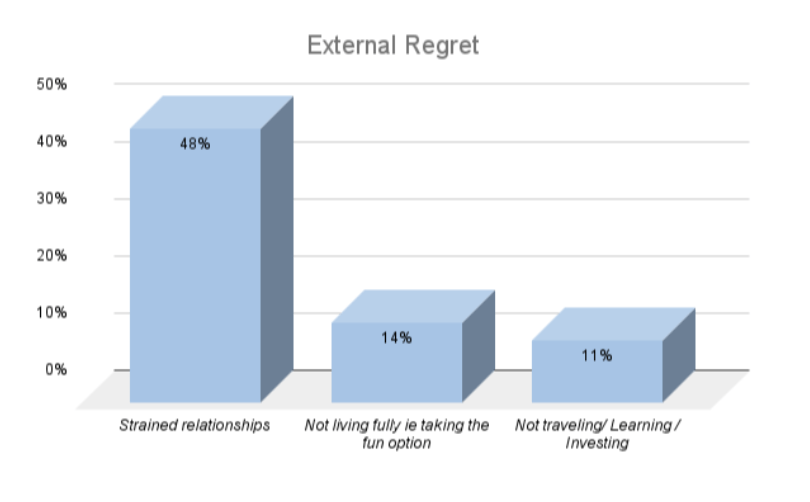
Internal Regret
- Not following my heart or gut instinct (31%)
- Living with fear and self doubt (27%)
- Holding onto resentment (13%)
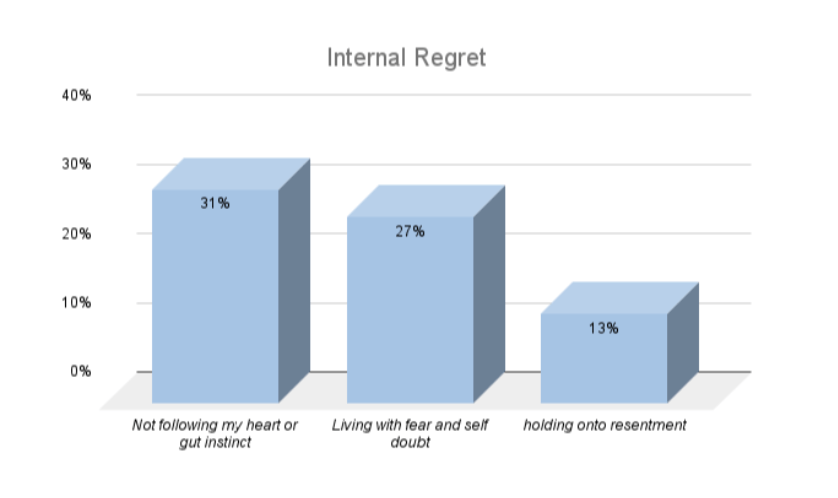 Perhaps most strikingly here is that over the two categories of internal and external regret, the most common regret (by far!) was linked to strained relationships. It’s also really interesting to note that under the umbrella of relationships, we found that people regretted not only the absence of a positive and meaningful individual in their life i.e losing touch with friends, not visiting parents consistently before they passed on or ruining relationships with their children, but there was also an equal amount of regret for maintaining unhealthy relationships. Examples commonly included things like staying in unhealthy romantic relationships that should have ended earlier and maintaining toxic friendships.
Perhaps most strikingly here is that over the two categories of internal and external regret, the most common regret (by far!) was linked to strained relationships. It’s also really interesting to note that under the umbrella of relationships, we found that people regretted not only the absence of a positive and meaningful individual in their life i.e losing touch with friends, not visiting parents consistently before they passed on or ruining relationships with their children, but there was also an equal amount of regret for maintaining unhealthy relationships. Examples commonly included things like staying in unhealthy romantic relationships that should have ended earlier and maintaining toxic friendships.
Looking at the remaining external regrets, we can also see that not pursuing the exciting or fun option in life is something that many people look back on with sorrow. Whether that relates to traveling, romance, vocation, or even further education, these examples certainly speak to the notion, although somewhat cliche, that You only live once, and that these opportunities were missed.
As we jump across to the internal regret category, we can similarly see that the top two regrets accounted for almost 60% of all internal regrets. Although broken down into not following my heart or gut instinct and living with fear and self doubt, we can certainly see that many of us are familiar with a feeling of not living authentically or honoring our desires through the way that we express our individuality (picture a mental prison cell for your beautiful personality).
The comment of “You won’t regret trying but you will regret not trying” (Question 5), reinforces the idea that it’s the inaction or the defiance of following our hearts that indeed creates the regret, not the outcome trying, successful or not.
The Link Between Internal and External Regret
In a practical sense then, if we look more closely at the intersection of both internal and external regrets, we can actually see where they dissect (quite poetically, if you ask me!).
While internally, the regret of not following ones heart evokes a feeling of psychological stagnation, it’s not too hard to then imagine that the physical manifestation of this feeling may indeed be represented by us not taking physical action in our real lives i.e not telling someone that you love them often enough, not booking your dream trip or following the orders of someone else instead of actioning your very own dream.
Like a bit of a flirt, I’m going to leave it there for now and let us percolate on the above. Next month I’ll be going one layer deeper to further explore the various aspects of regret, including the concept of ‘The Regret Monster’ (just go with me here), the Mind-Body relationship of Regret and how we can best change our relationship with regret to optimize our lives.
The Wrap-Up
So to wrap up the first newsletter in this mini-series on regret; what did we learn?
- The majority of us have regrets.
- The majority of those with regret, manage it well.
- Mistakes and regrets are two different things.
- Mistakes are inevitable and should be embraced as a pathway to growth. We’ve all made mistakes (unless you’re my girlfriend) 😉
- Regret is the psychological response to a mistake.
- Regret can have both positive and negative consequences in our lives. The choice is ours
- Regret can teach us valuable lessons.
- There are two types of regrets; internal and external.
- Internal regrets seem to influence the external regrets, and vice versa,
- The most common external regrets are those linked to relationships.
- The most common internal regrets related to not following our hearts
Thanks for reading and I hope you make many mistakes between now and the next time we chat.
—Seb




